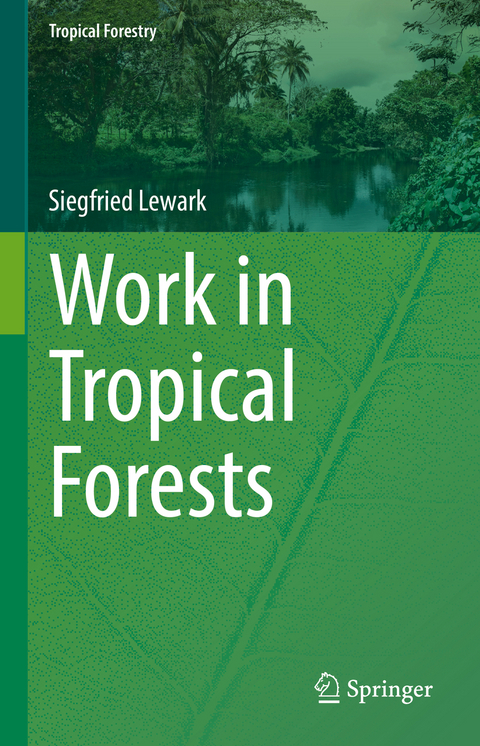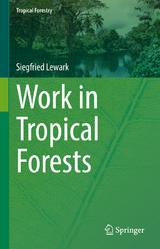Work in Tropical Forests
Springer Berlin (Verlag)
978-3-662-64442-3 (ISBN)
The abilities of the workers and their efforts while fulfilling their tasks, resulting in performance and workload, are described with many examples of published studies. Influencing variables from organizational, technical and managerial sides are considered as much as included in the studies.
The detailed descriptions demonstrate the methodical state of ergonomic research. For better understanding of the coverage the background of the development of forest work science is described. The lasting influence of Taylorism and the roles of ILO and FAO as well as NGOs, e.g. in certification, arepointed out.lt;p>Siegfried Lewark is professor of forest work science at the University of Freiburg, Germany. His teaching, research and consulting in work organization and forest technology and operations was focused on ergonomic and social aspects. He supervised numerous theses, e.g. by Master students and PhD researchers from tropical Africa. Main topics were working conditions, safety and health, related to performance, on all levels of forestry and wood industry, as well as gender studies, competence development, education and e-learning. The book is based on the broad international experience of the author in countries such as Indonesia and China, over many years, and his activities in scientific networks on international level.
Part I: The Perspective of Work Science.- People and Work in Tropical Forests: An Introduction.- Work and Sustainable Forest Management.- Development of Work Science.- Part II: Sample Work Studies.- Methodology of Work Study.- Work in Plantation Forests.- Work for Industrial Forest Utilization in Natural Forests.- Work for Non-Industrial Forest Utilization in Natural Forests.- Part III: Insights from Work Science into Work in Tropical Forests.- Some Issues of Work in Tropical Forests, in a Nutshell.- Some Thoughts at the End.
"Die tropischen Wälder verschwinden in dramitischer Geschwindigkeit. Die Gründe für ihre Zerstörung sind extrem komplex, unterscheiden sich von Land zu Land und haben wirtschaftliche, politische und gesellschaftliche Faktoren als Ursache. Das macht dieses Buch aus der Reihe "Tropical Forestry" des Freiburger Hochschullehrers und Kollegen, der über reichlich Erfahrung zum Thema aus Theorie und Praxis verfügt, besonders wichtig für die Zielgruppe aus Experten vor Ort, Ressourcenmanagern und Beteiligten in der Politik, Administration und den Verbänden ..." (Forstliche Mitteilungen, Jg. 76, Heft 6-8, 2023)
“Die tropischen Wälder verschwinden in dramitischer Geschwindigkeit. Die Gründe für ihre Zerstörung sind extrem komplex, unterscheiden sich von Land zu Land und haben wirtschaftliche, politische und gesellschaftliche Faktoren als Ursache. Das macht dieses Buch aus der Reihe „Tropical Forestry“ des Freiburger Hochschullehrers und Kollegen, der über reichlich Erfahrung zum Thema aus Theorie und Praxis verfügt, besonders wichtig für die Zielgruppe aus Experten vor Ort, Ressourcenmanagern und Beteiligten in der Politik, Administration und den Verbänden ...” (Forstliche Mitteilungen, Jg. 76, Heft 6-8, 2023)
| Erscheinungsdatum | 05.03.2022 |
|---|---|
| Reihe/Serie | Tropical Forestry |
| Zusatzinfo | XII, 295 p. 11 illus. in color. |
| Verlagsort | Berlin |
| Sprache | englisch |
| Maße | 155 x 235 mm |
| Gewicht | 619 g |
| Themenwelt | Naturwissenschaften ► Biologie ► Ökologie / Naturschutz |
| Weitere Fachgebiete ► Land- / Forstwirtschaft / Fischerei | |
| Schlagworte | Decent Work • Social Sustainability • Tropical Forest Utilization • Working conditions • Work Science |
| ISBN-10 | 3-662-64442-8 / 3662644428 |
| ISBN-13 | 978-3-662-64442-3 / 9783662644423 |
| Zustand | Neuware |
| Informationen gemäß Produktsicherheitsverordnung (GPSR) | |
| Haben Sie eine Frage zum Produkt? |
aus dem Bereich




